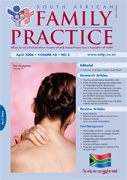The maintenance of competence of rural district hospital practitioners
Keywords:
education, CPD, rural practitioners
Abstract
Introduction It is important for rural district hospital practitioners to maintain their competence to provide equitable health service for rural communities. The scope of their practice dictates that they must stay up-to-date with a large variety of knowledge and skills despite limited educational opportunities. Rural practitioners use continuing professional development (CPD) activities that are most accessible to them, but it is not known whether these activities are educationally sound and effective. Aim We designed a study to investigate the content and methods used for the maintenance of competence by rural district hospital practitioners in the Western Cape Province, South Africa. Methods Expert opinion was sought to evaluate the topics requiring up-dating and the validity of the learning methods to maintain competence in practice. This was achieved by employing the Delphi technique to reach consensus on content and methodology. Categorical data analysis and a principal factor analysis were performed. The qualitative data were developed into themes and presented as a conceptual framework. Results Consensus was reached on the principal content areas requiring updating. Methods that were found most useful were in-service learning under supervision, structured courses, small group discussions and practical workshops. Rotations in tertiary hospitals, lectures by specialists, journal reading and Internet learning were less supported. Conclusion This study provides a practical model for continuing instruction plus self-directed learning in context. Three content domains were established namely; commonly encountered areas of practice; identified gaps and needs specific to the practitioner and the setting. The implementation of external updating programmes must be tailored to suit the practitioners while the self-directed aspects should include reflective practice. Priority areas are identified and classified as well as educational methods which can contribute towards the maintenance of competence of rural practitioners.
Published
2006-05-01
Section
Original Research
By submitting manuscripts to SAFP, authors of original articles are assigning copyright to the South African Academy of Family Physicians. Copyright of review articles are assigned to the Publisher, Medpharm Publications (Pty) Ltd, unless otherwise specified. Authors may use their own work after publication without written permission, provided they acknowledge the original source. Individuals and academic institutions may freely copy and distribute articles published in SAFP for educational and research purposes without obtaining permission.

